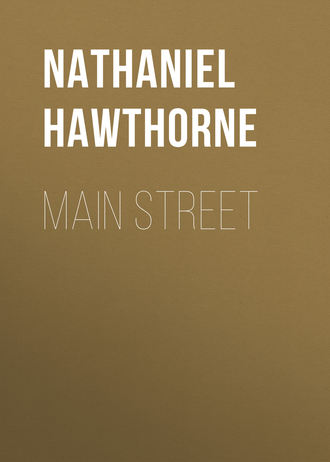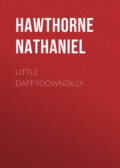
Натаниель Готорн
Main Street
Behold! here is a spectacle which should be ushered in by the peal of trumpets, if Naumkeag had ever yet heard that cheery music, and by the roar of cannon, echoing among the woods. A procession,—for, by its dignity, as marking an epoch in the history of the street, it deserves that name,—a procession advances along the pathway. The good ship Abigail has arrived from England, bringing wares and merchandise, for the comfort of the inhabitants, and traffic with the Indians; bringing passengers too, and, more important than all, a governor for the new settlement. Roger Conant and Peter Palfrey, with their companions, have been to the shore to welcome him; and now, with such honor and triumph as their rude way of life permits, are escorting the sea-flushed voyagers to their habitations. At the point where Endicott enters upon the scene, two venerable trees unite their branches high above his head; thus forming a triumphal arch of living verdure, beneath which he pauses, with his wife leaning on his arm, to catch the first impression of their new-found home. The old settlers gaze not less earnestly at him, than he at the hoary woods and the rough surface of the clearings. They like his bearded face, under the shadow of the broad-brimmed and steeple-crowned Puritan hat;—a visage resolute, grave, and thoughtful, yet apt to kindle with that glow of a cheerful spirit by which men of strong character are enabled to go joyfully on their proper tasks. His form, too, as you see it, in a doublet and hose of sad-colored cloth, is of a manly make, fit for toil and hardship, and fit to wield the heavy sword that hangs from his leathern belt. His aspect is a better warrant for the ruler’s office than the parchment commission which he bears, however fortified it may be with the broad seal of the London council. Peter Palfrey nods to Roger Conant. “The worshipful Court of Assistants have done wisely,” say they between themselves. “They have chosen for our governor a man out of a thousand.” Then they toss up their hats,—they, and all the uncouth figures of their company, most of whom are clad in skins, inasmuch as their old kersey and linsey-woolsey garments have been torn and tattered by many a long month’s wear,—they all toss up their hats, and salute their new governor and captain with a hearty English shout of welcome. We seem to hear it with our own ears, so perfectly is the action represented in this life-like, this almost magic picture! But have you observed the lady who leans upon the arm of Endicott?–a rose of beauty from an English garden, now to be transplanted to a fresher soil. It may be that, long years—centuries indeed—after this fair flower shall have decayed, other flowers of the same race will appear in the same soil, and gladden other generations with hereditary beauty. Does not the vision haunt us yet? Has not Nature kept the mould unbroken, deeming it a pity that the idea should vanish from mortal sight forever, after only once assuming earthly substance? Do we not recognize, in that fair woman’s face, a model of features which still beam, at happy meets, on what was then the woodland pathway, but has out since grown into a busy street?
“This is too ridiculous!—positively insufferable!” mutters the same critic who had before expressed his disapprobation. “Here is a pasteboard figure, such as a child would cut out of a card, with a pair of very dull scissors; and the fellow modestly requests us to see in it the prototype of hereditary beauty!”
“But, sir, you have not the proper point of view,” remarks the showman. “You sit altogether too near to get the best effect of my pictorial exhibition. Pray, oblige me by removing to this other bench, and I venture assure you the proper light and shadow will transform the spectacle into quite another thing.”
“Pshaw!” replies the critic; “I want no other light and shade. I have already told you that it is my business to see things just as they are.”
“I would suggest to the author of this ingenious exhibition,” observes a gentlemanly person, who has shown signs of being much interested,—“I would suggest that Anna Gower, the first wife of Governor Endicott, and who came with him from England, left no posterity; and that, consequently, we cannot be indebted to that honorable lady for any specimens of feminine loveliness now extant among us.”
Having nothing to allege against this genealogical objection, the showman points again to the scene.
During this little interruption, you perceive that the Anglo-Saxon energy—as the phrase now goes—has been at work in the spectacle before us. So many chimneys now send up their smoke, that it begins to have the aspect of a village street; although everything is so inartificial and inceptive, that it seems as if one returning wave of the wild nature might overwhelm it all. But the one edifice which gives the pledge of permanence to this bold enterprise is seen at the central point of the picture. There stands the meeting-house, a small structure, low-roofed, without a spire, and built of rough timber, newly hewn, with the sap still in the logs, and here and there a strip of bark adhering to them. A meaner temple was never consecrated to the worship of the Deity. With the alternative of kneeling beneath the awful vault of the firmament, it is strange that men should creep into this pent-up nook, and expect God’s presence there. Such, at least, one would imagine, might be the feeling of these forest-settlers, accustomed, as they had been, to stand under the dim arches of vast cathedrals, and to offer up their hereditary worship in the old ivy-covered churches of rural England, around which lay the bones of many generations of their forefathers. How could they dispense with the carved altar-work?—how, with the pictured windows, where the light of common day was hallowed by being transmitted through the glorified figures of saints?—how, with the lofty roof, imbued, as it must have been, with the prayers that had gone upward for centuries?—how, with the rich peal of the solemn organ, rolling along the aisles, pervading the whole church, and sweeping the soul away on a flood of audible religion? They needed nothing of all this. Their house of worship, like their ceremonial, was naked, simple, and severe. But the zeal of a recovered faith burned like a lamp within their hearts, enriching everything around them with its radiance; making of these new walls, and this narrow compass, its own cathedral; and being, in itself, that spiritual mystery and experience, of which sacred architecture, pictured windows, and the organ’s grand solemnity are remote and imperfect symbols. All was well, so long as their lamps were freshly kindled at heavenly flame. After a while, however, whether in their time or their children’s, these lamps began to burn more dimly, or with a less genuine lustre; and then it might be seen how hard, cold, and confined was their system,—how like an iron cage was that which they called Liberty.
Too much of this. Look again at the picture, and observe how the aforesaid Anglo-Saxon energy is now trampling along the street, and raising a positive cloud of dust beneath its sturdy footsteps. For there the carpenters are building a new house, the frame of which was hewn and fitted in England, of English oak, and sent hither on shipboard; and here a blacksmith makes huge slang and clatter on his anvil, shaping out tools and weapons; and yonder a wheelwright, who boasts himself a London workman, regularly bred to his handicraft, is fashioning a set of wagon-wheels, the track of which Wall soon be visible. The wild forest is shrinking back; the street has lost the aromatic odor of the pine-trees, and of the sweet-fern that grew beneath them. The tender and modest wild-flowers, those gentle children of savage nature that grew pale beneath the ever-brooding shade, have shrank away and disappeared, like stars that vanish in the breadth of light. Gardens are fenced in, and display pumpkin-beds and rows of cabbages and beans; and, though the governor and the minister both view them with a disapproving eye, plants of broad-leaved tobacco, which the cultivators are enjoined to use privily, or not at all. No wolf, for a year past, has been heard to bark, or known to range among the dwellings, except that single one, whose grisly head, with a plash of blood beneath it, is now affixed to the portal of the meeting-house. The partridge has ceased to run across the too-frequented path. Of all the wild life that used to throng here, only the Indians still come into the settlement, bringing the skins of beaver and otter, bear and elk, which they sell to Endicott for the wares of England. And there is little John Massey, the son of Jeffrey Massey and first-born of Naumkeag, playing beside his father’s threshold, a child of six or seven years old. Which is the better-grown infant,—the town or the boy?
The red men have become aware that the street is no longer free to them, save by the sufferance and permission of the settlers. Often, to impress them with an awe of English power, there is a muster and training of the town-forces, and a stately march of the mail-clad band, like this which we now see advancing up the street. There they come, fifty of them, or more; all with their iron breastplates and steel caps well burnished, and glimmering bravely against the sun; their ponderous muskets on their shoulders, their bandaliers about their waists, their lighted matches in their hands, and the drum and fife playing cheerily before them. See! do they not step like martial men? Do they not manoeuvre like soldiers who have seen stricken fields? And well they may; for this band is composed of precisely such materials as those with which Cromwell is preparing to beat down the strength of a kingdom; and his famous regiment of Ironsides might be recruited from just such men. In everything, at this period, New England was the essential spirit and flower of that which was about to become uppermost in the mother-country. Many a bold and wise man lost the fame which would have accrued to him in English history, by crossing the Atlantic with our forefathers. Many a valiant captain, who might have been foremost at Marston Moor or Naseby, exhausted his martial ardor in the command of a log-built fortress, like that which you observe on the gently rising ground at the right of the pathway,—its banner fluttering in the breeze, and the culverins and sakers showing their deadly muzzles over the rampart.
A multitude of people were now thronging to New England: some, because the ancient and ponderous framework of Church and State threatened to crumble down upon their heads; others, because they despaired of such a downfall. Among those who came to Naumkeag were men of history and legend, whose feet leave a track of brightness along any pathway which they have trodden. You shall behold their life-like images—their spectres, if you choose so to call them—passing, encountering with a familiar nod, stopping to converse together, praying, bearing weapons, laboring or resting from their labors, in the Main Street. Here, now, comes Hugh Peters, an earnest, restless man, walking swiftly, as being impelled by that fiery activity of nature which shall hereafter thrust him into the conflict of dangerous affairs, make him the chaplain and counsellor of Cromwell, and finally bring him to a bloody end. He pauses, by the meetinghouse, to exchange a greeting with Roger Williams, whose face indicates, methinks, a gentler spirit, kinder and more expansive, than that of Peters; yet not less active for what he discerns to be the will of God, or the welfare of mankind. And look! here is a guest for Endicott, coming forth out of the forest, through which he has been journeying from Boston, and which, with its rude branches, has caught hold of his attire, and has wet his feet with its swamps and streams. Still there is something in his mild and venerable, though not aged presence—a propriety, an equilibrium, in Governor Winthrop’s nature—that causes the disarray of his costume to be unnoticed, and gives us the same impression as if he were clad in such rave and rich attire as we may suppose him to have worn in the Council Chamber of the colony. Is not this characteristic wonderfully perceptible in our spectral representative of his person? But what dignitary is this crossing from the other side to greet the governor? A stately personage, in a dark velvet cloak, with a hoary beard, and a gold chain across his breast; he has the authoritative port of one who has filled the highest civic station in the first of cities. Of all men in the world, we should least expect to meet the Lord Mayor of London—as Sir Richard Saltonstall has been, once and again—in a forest-bordered settlement of the western wilderness.







